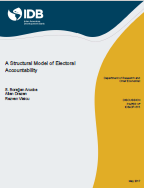A Structural Model of Electoral Accountability
Date
May 2017
Journal version
Summary
This paper proposes a structural approach to measuring the effects of electoral accountability. A political agency model with imperfect information is modeled in order to identify and quantify discipline and selection effects, using data on U.S. governors. It is found that the possibility of reelection provides a significant incentive for incumbents to exert effort, that is, a disciplining effect. A positive but weaker selection effect is also found. According to the model, the widely-used two-term regime improves voter welfare by 4.2 percent compared to a one-term regime and better voter information about the effort of governors would further increase voter welfare by up to 0.5 percent.




